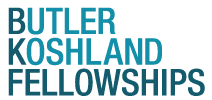After learning that Lew Butler was about to retire as long-time board chair of California Tomorrow, a group of his friends and admirers began looking for a way to honor his deep commitment to public service and allow him to continue doing great work. They formed the “Friends of Lew” committee in 2002 and set about raising funds to support Lew’s philanthropy. The committee was able to raise more than $800,000, which they deposited in a donor-advised fund at the San Francisco Foundation. The fund was presented to Lew on his seventy-fifth birthday to his great surprise.
The “Friends of Lew” Committee: Bob Friedman; Susan Hirsch; Bruce Kelley; Leonard Kingsley; Marty Krasney; Tom Layton; Al Schreck.
“Friends of Lew Committee Chair, Bob Friedman, told the story of this campaign during an interview in February, 2012:
It seems remarkable in hindsight that the “Friends of Lew” were able to raise over $800,000 from individual donors—especially since we had no real plan for the money other than to give it to Lew to do what he does so well—imagine high impact very human philanthropic programs. What we did know for sure was that Lew is incredible about knowing how to give away money and that we didn’t want the nonprofit world to be without his skill—he is considered to be a guardian angel by many civic leaders, myself included. I’d watched him over the years as he served as a board member with the Rosenberg Foundation, the John Hay Whitney Foundation, the San Francisco Foundation, the Ploughshares Fund, and the Joyce Foundation amongst others and admired what was at the time a radical approach to grantmaking. Humble and creative, Lew pushed for real social change at a systemic level, “change not charity.” He rejected the idea that foundations deserved worship and should operate with a top-down philosophy, and focused on the wisdom that can be found at the community level where people are engaged in trying solve problems that affect them personally. His values remained rooted in the simple idea that people are good and that given the proper support they’d do good—he was always searching for people doing great things and then trying to find a way to keep them going. When the “Friends of Lew” committee raised funds in Lew’s honor, it was to provide him a vehicle to exercise this genius—his sense of how to find and support common people doing uncommon things.
When Lew told me that he planned on using the Butler Koshland Fund to support fellowships, I knew we were all right in thinking he’d find something great to do with this gift.
